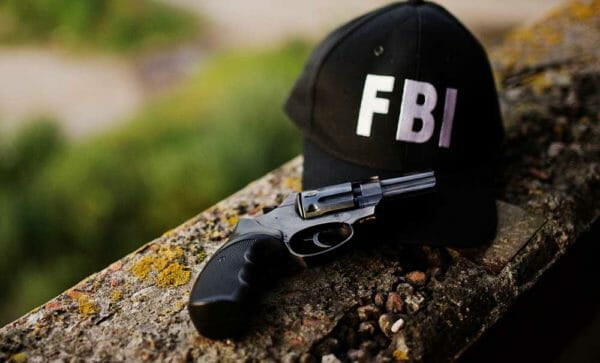
Arizona -(Ammoland.com)- In March of 2020, the Office of the Inspector General (OIG) of the United States Department of Justice released an audit of the Federal Bureau of Investigation (FBI) controls over weapons, munitions, and explosives.
The FBI has 57,812 firearms in their inventory. Extrapolating from the numbers in the survey recorded in the report, the FBI has about 2.8 million rounds of ammunition on hand, relatively small numbers of less than lethal munitions, and small amounts of explosives.
The FBI is not a national police force. They are closer to a national detective, or some say a “secret police” force. Their primary job, as indicated in their name, is investigation, not patrolling, not responding to emergency calls or enforcement.
Given the size of the organization and the number of agents and offices (over 13,000 special agents, 400 domestic offices, 91 foreign offices), the audit shows the agency is keeping very tight control over the firearms it has. The time and resources devoted to this task have been ramped up over the years.
In 2002, the agency was losing 7.6 firearms per month. In 2007, they were losing 3.2 firearms per month. In the latest audit, ending in July 2019, they were losing a bit less than 1 firearm per month.
The summation in the audit lumps all the lost and stolen firearms over nearly four years in one paragraph. It makes the absolute numbers look bigger. A common way to lie with statistics is to report absolute numbers instead of rates. From the OIG audit:
Lost and Stolen Firearms – We noted that between
September 2016 and July 2019, 38 FBI Special Agents
were disciplined for the loss or theft of 45 FBI-issued
firearms. The FBI suspended 37 and dismissed 1 of the
Special Agents held responsible for the loss or theft. Of
the 45 lost or stolen firearms, 24 have been recovered,
1 of which was used in a crime. We also found that the
FBI did not maintain complete documentation for 8 of
the 45 lost or stolen firearms, including its make,
model, or serial number; and a stolen firearm that was
subsequently recovered more than 1 year ago was still
marked as lost or stolen in AMS.
What is the purpose of the extremely tight controls on firearms at the FBI?
The United States has over 450 million firearms in private hands. One or ten dozen firearms lost by the FBI will not make a measurable difference in the crime rate.
It is all about image. The FBI has always placed its public image [the present Obama/Biden/FBI leadership attempted takedown of a sitting president not with standing] to be of the highest concern. The Legacy Media in the United States has a fixation on viewing firearms as a great evil, in themselves. The scandal of an FBI firearm being lost and used in a crime is something the FBI culture dreads. The FBI places its public image, and avoidance of media scorn, as perhaps the greatest value it possesses. The FBI is willing to expend vast amounts of manpower and money to prevent a scandal involving an FBI owned firearm and or explosives.
Mentioned, but not enumerated in the audit, are the measures the FBI takes to destroy firearms that come into the possession of the FBI.
Instead of taking the obvious, fiscally responsible method of selling surplus firearms back into commercial channels, the FBI has an elaborate system for destroying firearms. It is a national scandal to devote so much time and money to destroy valuable assets. Again, it is the image of the FBI and currying favor with the Legacy Media which takes precedence.
As with most government agencies, the FBI has not been concerned with efficiency or conserving money. It is other people’s money they are spending.
The check on the system is agents hate doing the administrative scut work of tight inventory controls and logbooks. Some controls are necessary, or agencies would be robbed blind. Allow people free access to unlimited ammunition or gasoline, and your budget will be broken with purchases of ammunition or gasoline to satisfy an unlimited demand.
The answer is to make agents responsible for firearms under their control (and they are) and to log the amount of ammunition they receive (not always done, but steps are being taken to improve the tracking). Ten thousand rounds of ammunition per agent per year is not unreasonable. It is a small percentage of the cost of maintaining a special agent. They should be encouraged to be proficient with their duty weapons.
40 years ago, an FBI agent told me they were encouraged to practice with government ammunition. It was a good policy.
Bureaucracies have a bias toward always increasing controls, and almost never loosening them.
The OIG audit shows the FBI controls over firearms are rigid, some could argue too ridged. Surplus firearms should be sold, not destroyed. Ammunition, for the most part, is handled properly.
Agents’ time is better spent investigating crimes instead of conducting multiple, redundant inventories. Please read for yourself the attached audit as it is an interesting read and an educational window into a large Federal agency’s handling and supervision of guns, ammo, or explosives. Also, see the OIG’s official press release on the audit attached below.
OIG Audit of the Federal Bureau of Investigation’s Controls Over Weapons, Munitions, And Explosives a20041
Press Release DOJ OIG Releases Report on the FBI’s Controls Over Weapons, Munitions, And Explosives 2020-03-24
About Dean Weingarten:
Dean Weingarten has been a peace officer, a military officer, was on the University of Wisconsin Pistol Team for four years, and was first certified to teach firearms safety in 1973. He taught the Arizona concealed carry course for fifteen years until the goal of Constitutional Carry was attained. He has degrees in meteorology and mining engineering and retired from the Department of Defense after a 30-year career in Army Research, Development, Testing, and Evaluation.
